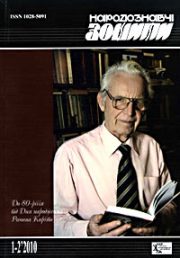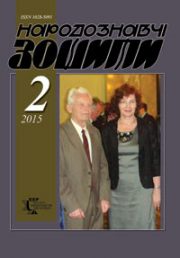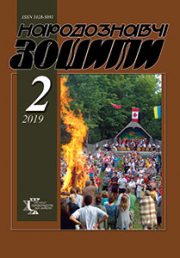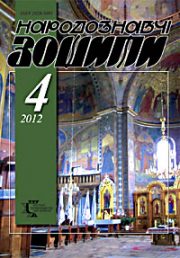The Ethnology Notebooks. 2023. № 1 (169), 70—76
UDK 930.2(477)”18/19″:[81’42’38:001]
DOI https://doi.org/10.15407/nz2023.01.070
SCIENTIFIC STYLE OF ANTONII PETRUSHEVYCH (1821—1913)
RIZUN Nazar
- ORCID ID: https://orcid.org/0000-0002-2878-2652
- PhD in History (Candidate of Historical Sciences),
- Junior Research Fellow of the Manuscript Department,
- Vasyl Stefanyk National Scientific Library of Ukraine in Lviv,
- 2, Stefanyka St., 79000, Lviv, Ukraine,
- Contacts: e-mail: nrizun1991@gmail.com
Abstract. The relevance of the topic consists in the importance of the study of the historiographic styles for the deepening of our understanding of the development of Ukrainian historiography and in the absence of works devoted to the scientific style of A. Petrushevych. This question was considered only in larger studies or articles on related topics. All of this defines the relevance of this paper. The article’s purpose is the study of the scientific style of A. Petrushevych, which takes into account previous research as well as cultural and intellectual contexts of the era. Based on a particular examples from the Slavistic works of the scholar the features of combining of substantive and stylistic elements are considered.
The object of the study is the scientific heritage of A. Petrushevych in the realm of Slavic studies, and the subject — the scientific style of the Galician historian.
The methodology of the study is based on the principles of objectivity and historicism, the use of general historical, historiographic, and comparative methods.
In the conclusion it was possible to further confirm a prevalent in the contemporary historiography thesis about at least a partial belonging of A. Petrushevych to the historians-positivists. At the same time, due to the consideration of the materials of a few Slavistic works of the scholar, combining of substantive and stylistic elements is highlighted as well as arguments for the presence in his texts of the traits of romanticism are provided. Most likely, primarily they were typical for the earliest, mostly Slavistic studies of A. Petrushevych.
Also, the need for the use in the research on the historiographic styles of theoretical achievements of such disciplines, as philology and literary studies, is noted, the importance of further study of this problem is emphasized. In the next studies we should take into consideration more works of A. Petrushevych, analyze their scientific style in the broader context of the formation of Ukrainian historical thought in the period of the second part of the 19th — the beginning of the 20th century.
Keywords: text, scientific style, Antonii Petrushevych, romanticism, positivism, historiography.
Received 5.01.2023
REFERENCES
- Yas, O., & Smolii, V. (Ed.). (2014). Historian and style. Famous figures of Ukrainian historical writing in the light of cultural ages (the beginning of the 19th — the 80-s of the 20th century): Monograph: in 2 parts (Part 1). Kyiv: NAN Ukrainy; In-t of the history of Ukraine [in Ukrainian].
- Yas, O. (2008). Romanticism and Ukrainian grand-narrative. Eidos, 3, 207—226 [in Ukrainian].
- Korolko, A. (2014). The Religious memories of Galicia, Bukovina and Moldova in local history research by Anthony Petrushevych. The Carpathians: populace, ethnos, civilization, 5, 238—247 [in Ukrainian].
- Korolko, A. (2017—2018). Church history of Galicia in Antonіі Petrushevych’s scientific research. The Carpathians: populace, ethnos, civilization, 78, 414—430 [in Ukrainian].
- Halas, B. (2010). To the image of A. Petrushevych as lexicograph and public figure. Contemporary problems of philological and literary studies. A collection of scientific works, 14, 34—39 [in Ukrainian].
- Bulyk, N. (2008). Archaeological centers in L’viv (1875—1914): scientific researches and field achievements. Archaeological studies of Lviv University, 11, 209—237 [in Ukrainian].
- Bulyk, N. (2011). Archaeology at Anton Petrushevych’s scientific inheritance. The materials of the studies in archaeology of Prykarpattia and Volyn, 15, 415—428 [in Ukrainian].
- Kolosovska, O. (2004). Slavonic A. Petruszevych library foundation. Problems of Slavonic Studies, 54, 190—201 [in Ukrainian].
- Halyk, V. (2012). Relationship of Ivan Franko and leading figure of Stauropegion institute Anton Petrushevych. Newsletter of Precarpathian University. History, 21, 19—26 [in Ukrainian].
- Korolko, A. (2000). Ancient Halych in historical and ethnographic studies of A. Petrushevych. Newsletter of Precarpathian University. History, 3, 159—166 [in Ukrainian].
- Korolko, A. (2000). A. Petrushevych — scholar of Bukovinian and Moldavian antiquities. Questions of history of Ukraine. A collection of scientific articles, 4, 383—386 [in Ukrainian].
- Olenych, Ya. (2015). Galician historical Slavic studies in 1830—1894 years: subject and methodology of research. Scientific Notes of Ostroh Academy National University, 24, 136—143 [in Ukrainian].
- Kutsyi, I. (2006). The Ukrainian scientific historical idea of Galicia (1830-es— 1894): the reception of the national history. Ternopil: Dzhura [in Ukrainian].
- Polishchuk, Yu. (2017). Ukrainian romantic historiography in the studies of Myron Korduba. Eminak: Scientific Quarterly Journal, 2 (3), 84—91 [in Ukrainian].
- Skrynnyk, M. Foundational ideas of Ukrainian romanticism. Notes of NTSh. Works of historical-philological section, 222, 201—215 [in Ukrainian].
- Yakovenko, N. (2007). Introduction to history. Kyiv: Krytyka [in Ukrainian].
- Tymish, L. (2005). Evaluation of Ivan Franko of the scientific legacy of Anton Petrushevych. Drohobych Regional Studies, 9, 61—66 [in Ukrainian].
- Melnyk, Ya. (2010). «Fatherless and motherless». Antin Petrushevych: an essay by Ivan Franko. Ukrainian Literary Studies, 72, 239—267 [in Ukrainian].
- Lvivska natsionalna naukova biblioteka Ukrainy imeni V. Stefanyka. Viddil rukopysiv (next — LNNBU VR). F. 77. Op. 4. Spr. 790. P. 74 [in Yazychiie].
- Petrushevych, A.S. (1855). Slavs, their ancient places of living and the emergence among them of the first Slavic states. Family library. Monthly works devoted to history, literature, generally useful evidence and deeds of people, 1, 1—11 [in Yazychiie].
- Fedoriv, I., & Olenych, Ya. (2015). Problems ethnogenesis and the process of state of the Slavic peoples in Anton Petrushevych’s scientific heritage. Ukraine—Europe—World. International collection of scientific works. History. Vyp. 16. In 2 parts (Part 2). Ternopil: Vyd-vo TNPU im. V. Hnatiuka, 158—162 [in Ukrainian].
- LNNBU VR. F. 77. Op. 4. Spr. 873. P. 86 [in Yazychiie].
- Petrushevych, A.S. (1904). Was there among the pagan Slavs a god named Ese? Bulletin of «Narodnyi dim», 261 (12), 1843—1844 [in Yazychiie].
- Petrushevych, A.S. (1905). Was there among the pagan Slavs a god named Ese?, Bulletin of «Narodnyi dim», 1, 2—4 [in Yazychiie].
- LNNBU VR. F. 77. Op. 4. Spr. 877. P. 86 [in Yazychiie].
- Petrushevych, A.S. (1905). About the most ancient images of sun among the Scandinavians and the northern Slavs. Bulletin of «Narodnyi dim», 9, 133—136 [in Yazychiie].







